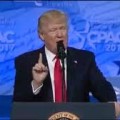
South Korea warns Kim Jong-un of ‘searing consequences’ if he launches long-range missile – Mirror Online
Criticism of President’s Trump’s decision to back out of negotiations with North Korea in response to Pyongyang statements that made the success of the talks suspect (it now appears the discussions are back on) is indicative of a lack of understanding about what the purpose of American diplomacy is.
Those critics cling to the failed negotiating strategies that have their roots in long-standing and flawed State Department concepts. The folks at “Foggy Bottom” ignore a basic premise: The purpose of U.S. diplomacy is to make life better and safer for the American people. Period.
It sounds simple enough, but it is a lesson that the U.S. diplomatic corps seem to have forgotten. There has been a flawed negotiating pattern that has been previously followed, particularly during the Obama Administration. It consisted of casting the United States as a nation that had much to apologize for; a willingness to enter into negotiations by first providing giveaways before receiving anything substantive in return; and placing “the interests of the world” above that of U.S. citizens. All three principals were faulty and did not lead to results that were beneficial to the American people.
For at least one hundred years, the United States has been the greatest force for good the planet has ever seen—including for those whom we have opposed in combat. One example: After the monumental war against Germany and Japan, America rebuilt those nations into entities greater than they ever were. Another example: Obama’s historically inaccurate apologies to the Moslem world, and his tilt towards them. The U.S. defended Egypt against our wartime allies, the British and the French, when they sought to control the Suez Canal. Reagan defended the people of Afghanistan against Soviet invaders. Washington defended Eastern European Moslems against genocide. Yes, the U.S. fought two wars against Saddam Hussein, but they were in response, at least partially, to his threats against other Moslem nations. And of course, the American people made several Middle Eastern nations rich by buying their oil, often at inflated prices.
There are further examples of how major diplomatic initiatives of the Obama-era State Department failed to benefit the American people. To cite two:
The former President’s deeply flawed Iran Nuclear “Agreement” (enacted without the Constitutionally mandated consent of the Senate) provided the Mullahs with billions in cash, and an end to sanctions, in response for little more than, at best, a delay in Tehran’s nuclear weapons program, a clear example of providing concessions without a substantive return. There was no significant benefit to the American people.
The Paris Climate “Accord” (which Obama also enacted without the Constitutionally mandated consent of the Senate) provided no appreciable environmental benefits but would have transferred wealth to third world nations. Again, no substantive benefit to the American people.
The State Department, and indeed presidents, are the employees of the American people. It is neither their responsibility nor their right to fulfill their ideas about providing benefits to the world at the expense of U.S. citizens. Indeed, that concept is also reflected in the open borders policy of many who believe the nation should welcome waves of illegal immigrants as part of an ideology that fails to make any distinction between American citizens and the people of other nations. In fact, by providing a safety valve, it actually allows the faulty and corrupt practices of morally bankrupt nations’ leaders to continue.
President Trump’s decision to (at least temporarily) back out of the North Korean talks is a rejection of the concept that negotiations for the sake of having negotiations is a good idea. The willingness to walk away from a bad deal strengthens one’s bargaining position in the long run.
Frank Vernuccio serves as editor-in-chief of the New York Analysis of Policy and Government.

















Follow Us